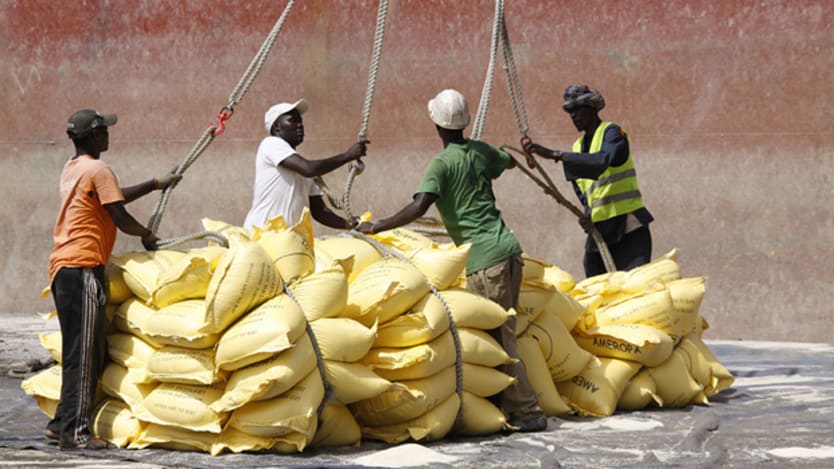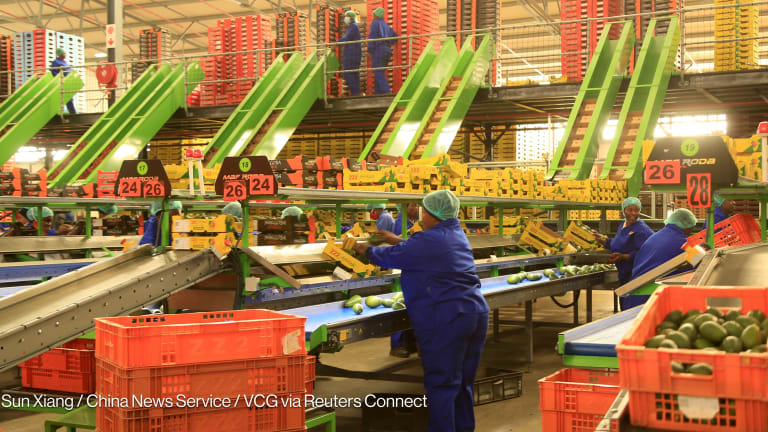
Since the 1950s, China has promoted a policy of food self-sufficiency. However, 2014 marks a significant change. This year, China’s leaders have proclaimed the end to grain self-sufficiency as a policy due to an increasing national demand for livestock food.
Soybeans are already imported in large quantities and corn imports are expected to double this year. At the same time, we are witnessing an upward trend in China’s overseas investment in the consumer sector, mainly due to the country’s hunger among its growing middle class for a more affluent diet.
See more #FeedingDev articles:
• How to fine-tune market systems to advance food security
• The struggling African farmer recast as enterprising entrepreneur
• Bricks and ladders: Integrating smallholder farmers into value chains
“Investments in this sector will grow at a much faster pace than in other sectors — including the natural resources sector,” Yang Zhizhong, chairman and chief executive of Nomura China told the Financial Times recently.
Indeed, these changed patterns will expand Chinese investments in Africa’s agriculture. Consequently, China is increasingly stepping into Africa, but with entirely different modalities and strategies. Is China therefore challenging Europe’s presence and influential role as both a major investor and aid provider in Africa?
A bird’s eye view of the past
China has been present in African agriculture for more than four decades but in recent years, the country has stepped up the volume and scale of its agricultural investments and trade activities in Africa. In fact, since the early 2000s, China’s focus has shifted to support for Africa’s economic liberalization and integration into the global agricultural commodities market. An important driver for this has been to strengthen food and other types of resources supply in order to satisfy domestically changing consumption patterns. In addition, China continues to aim at enhancing its political relations and boost commercial opportunities.
These steps have resulted in China’s increasing presence in Africa. Whereas Europe has been for many decades both the largest investor and provider of aid, their approaches greatly differ. While Europe tends to emphasize its soft power dimensions and value-driven approach — for example, by promoting human rights, transparency and democracy — China tends to promote its efficiency, speed, flexibility and technical capacity building approach. Generally, the African perspective is more nuanced and less polarized, pointing to the need for such partners to complement each other.
One such framework in which China and the European Union could complement each other is the Comprehensive Africa Agricultural Development Program, initiated in 2003 by the African Union. CAADP’s core logic is to create an Africa-led "level playing field" in agriculture, where all public and private partners can smoothly operate in line with African national policies.
Although China signed a memorandum of understanding with the African Union in 2011 — committing both parties to strengthening the participation of African and Chinese private sectors in the African agricultural sector — China’s engagement with CAADP is basically non-existent. Indeed, China is rather reluctant to engage under CAADP as it considers it a framework largely driven by traditional donors, while China supports a policy of non-conditionality and non-interference.
The ever-increasing need for dialogue
So how can CAADP become more attractive for emerging economies such as China? The first step in the right direction is for Africa to formulate clear directives and approaches towards its partners.
Despite growing research on agricultural support modalities and strategies employed by the traditional donors on the one hand and the emerging economies on the other hand, there remains a lack of mutual understanding and open communication. Europeans often view China’s external activities with skepticism, while Chinese representatives often see themselves as providing the modern and efficient alternative to the outdated, patronising and inefficient aid strategies of the EU.
Moreover, African stakeholders are often left out from international academic and policy discussions about sustainable agricultural development and the roles of traditional donors and emerging economies in Africa.
In order to eliminate certain perceptions and fill gaps in understanding, in November 2013, ECDPM organized an Informal Knowledge Platform on Sustainable Agricultural Investments. Held in Brussels, the workshop aimed to enhance understanding of the major issues faced by key players in the domain of agricultural investments in Africa. It focused, in particular, on issues in the areas of private investments, corporate social responsibility and public-private partnerships.
The strong interest by all participants made clear that this type of multi-stakeholder dialogue — and possible ensuing partnerships — can not only foster more effective implementation of CAADP, but can also contribute to the broader alignment among stakeholders from Africa, China and Europe. It also showcased a strong demand for continuing this type of informal platform.
Join the conversation with our LinkedIn group!
After the success of the first workshop, ECDPM will now organize a follow-up dialogue, planned for autumn 2014 — possibly in Beijing — that will cover topics ranging from broader discussions on public processes for partnerships for sustainable agricultural development to presentations of concrete private investment models. This dialogue is ultimately meant to explore cooperation opportunities between African, Chinese and European investors and development initiatives and it is to be hoped that this will include both government-to-government relations and as business-to-business relations, based on the specific needs voiced by African stakeholders through the CAADP framework.
Want to learn more? Check out Feeding Development's campaign site and tweet us using #FeedingDev.
Feeding Development is an online conversation hosted by Devex in partnership with ACDI/VOCA, Chemonics, Fintrac, GAIN, Nestlé and Tetra Tech to reimagine solutions for a food-secure future from seed and soil to a healthy meal.








